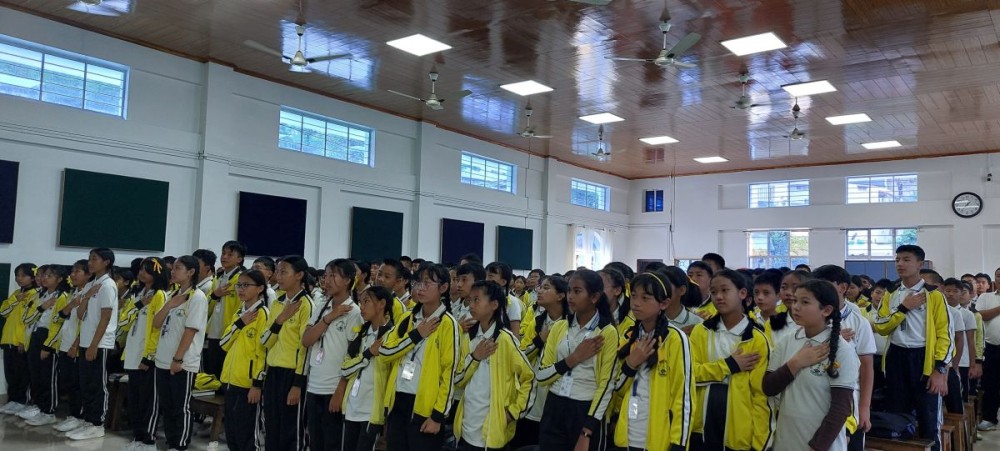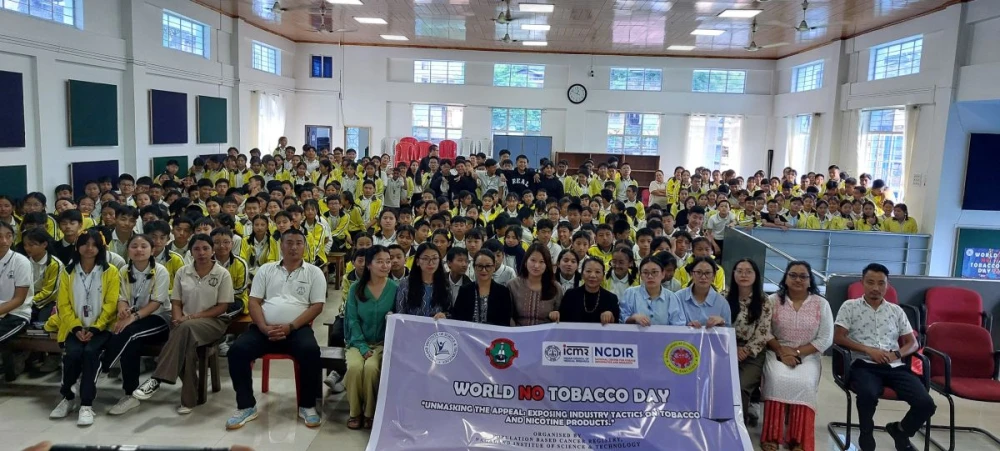Students and others taking a pledge for a tobacco-free world on Saturday at Coraggio School, Kohima. (Morung Photo)

Our Correspondent
Kohima | May 31
Health experts have expressed alarm over the rising number of cancer cases in Nagaland, attributing the surge primarily to the widespread use of tobacco products and urged urgent action to curb tobacco use among youth.
This was highlighted during a World No Tobacco Day event held today (May 31) at Coraggio School in Kohima, organised by the Population-Based Cancer Registry under the Nagaland Institute of Science and Technology (NIST), in collaboration with the Association of Oncologists of Northeast India (AONEI).
Dr V Khamo, Principal Investigator of the Population-Based Cancer Registry at NIST, described tobacco as one of the most dangerous public health threats, particularly for young people. She said tobacco is a leading cause of cancer and other major diseases such as heart conditions and stroke.
She highlighted the alarming rise in cancer cases in Nagaland and said tobacco remains a major contributing factor. “Cancer treatment is not only expensive but largely unavailable in Nagaland, forcing patients to seek care outside the state—placing immense financial and emotional strain on families,” she noted.
Dr Khamo called on students to reject tobacco in all forms, stating that despite its seemingly attractive packaging and accessibility, it is highly addictive and destructive. She encouraged them to serve as role models and lead change in their communities.
Dr Vetsolu Hiese Koza, Research Scientist at the Hospital-Based Cancer Registry and a dental surgeon, also addressed the gathering and spoke on this year’s theme, “Unmasking the Appeal: Exposing Industry Tactics on Tobacco and Nicotine Products.”

Dr Koza explained that tobacco, derived from the Nicotiana tabacum or Nicotiana rustica plant, contains nicotine, a psychoactive substance that causes rapid dependence.
“Tobacco kills around 12 to 13 lakh people in India every year, with approximately 3,500 deaths recorded daily. India also has the highest number of oral cancer cases globally,” she said.
Tobacco products, she added, fall into four broad categories—smoking, smokeless, heated tobacco, and nicotine-only products. She warned that all forms are harmful, including second-hand smoke, chewing tobacco, and even the dangerous habit of using tobacco powder as toothpaste. Vaping, she said, is an emerging threat among youth, often wrongly perceived as a safer option, despite delivering toxic chemicals.
Dr Koza also warned against the use of areca nut (supari), which is classified as a Group 1 carcinogen known to cause oral cancer.
She listed several toxic and carcinogenic substances commonly found in tobacco, including arsenic, acetone, ammonia, benzene, cadmium, carbon monoxide, formaldehyde, naphthalene, nickel, and radioactive polonium.
Tobacco use, she said, is also linked to a range of non-cancerous but serious health conditions such as stroke, blindness, gum disease, heart disease, respiratory illnesses, and even mental health problems including addiction and depression.
Urging students and educators to take an active stand, Dr Koza emphasised that quitting tobacco is one of the most important decisions a person can make for their health.
She also highlighted key provisions of the Cigarettes and Other Tobacco Products Act (COTPA), 2003, stating that the sale of tobacco to or by minors under 18 is a punishable offence, and sale is banned within 100 yards of educational institutions. While packaging is mandated to carry health warnings, she said the tobacco industry often attempts to obscure these warnings to mislead consumers.
She further condemned media portrayals that glamorise tobacco use and urged the public to reject such depictions. The programme concluded with a pledge for a tobacco-free world administered by Dr Koza.
Earlier, Annie Konthoujam, Headmistress of Coraggio School, delivered the welcome address and reiterated the institution’s status as a tobacco-free campus.






